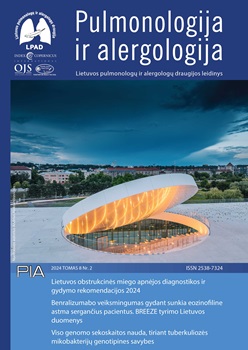Benralizumabo veiksmingumas gydant sunkia eozinofiline astma sergančius pacientus. BREEZE tyrimo Lietuvos duomenys
Santrauka
Retrospektyvusis benralizumabo tyrimas BREEZE, skirtas apibūdinti pacientų savybes, gydymo būdus ir rezultatus klinikinėje praktikoje Vidurio Rytų Europos ir Baltijos šalyse, yra tarptautinės programos XALOC dalis. Daugiacentrių Lietuvos klinikinės praktikos tyrimų duomenų, gydant sergančiuosius sunkia eozinofiline astma benralizumabu, nėra. Tikslas. Įvertinti benralizumabo veiksmingumą klinikinėje praktikoje, gydant sunkia eozinofiline astma sergančius pacientus Lietuvoje. Tyrimo metodai. Šiame tyrime aprašomi Lietuvos pacientų, dalyvavusių BREEZE tyrime, duomenys. Į tyrimą įtraukti suaugę pacientai, sergantys sunkia eozinofiline astma. Pacientų duomenys rinkti iki 56 sav. nuo gydymo pradžios. Rezultatai. Į tyrimą įtraukti 49 pacientai, iš jų 33 (69 proc.) buvo moterys. Vidutinis pacientų amžius, pradėjus skirti benralizumabą, buvo 59,5 metų. Tyrimo pradžioje eozinofilų kiekio kraujyje mediana buvo 0,5 × 109/l (60 proc. pacientų nustatyta 0,4 × 109/l ir daugiau), o vidutinis forsuoto iškvėpimo tūris per pirmą sekundę – 1,79 l. Pradėjus gydymą benralizumabu, geriamuosius gliukokortikoidus (GGK) nuolat vartojo aštuoni pacientai (16,3 proc.), o vidutinė prednizolono ekvivalento paros dozė buvo 10,4 mg. Pradinis vidutinis metinis astmos paūmėjimų dažnis buvo 2,79 (95 proc. pasikiautinasis intervalas (PI) – 2,34–3,31). Vidutinis metinis paūmė- jimų dažnis 16 ir 48 gydymo benralizumabu savaitę atitinkamai sumažėjo iki 0,31 (95 proc. PI – 0,11–0,66) ir 0,27 (95 proc. PI – 0,12–0,56). 56 gydymo savaitę GGK nebevartojo 87,5 proc. (n = 7) pacientų, vartojusių GGK tyrimo pradžioje. Išvados. Lietuvos klinikinėje praktikoje sunkia eozinofiline astma sergantiems pacientams skiriamas benralizumabas yra veiksmingas: metinis astmos paūmėjimų dažnis suretėjo 90 proc., o 87,5 proc. pacientų, anksčiau vartojusių GGK, nutraukė jų vartojimą. Reikšminiai žodžiai: sunki eozinofilinė astma, benralizumabas, paūmėjimai, geriamųjų gliukokortikoidų vartojimas.


